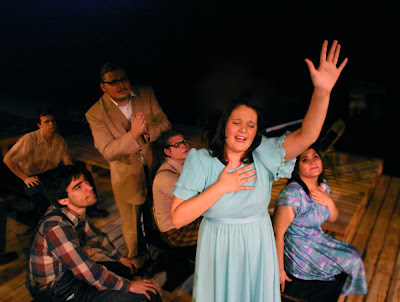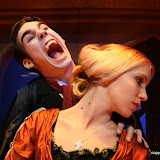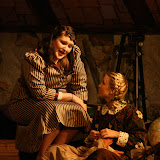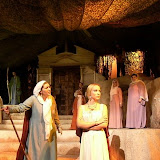Thursday, November 13, 2008
Your Co-Workers On Set
BREAKALEGG instructs us on the different co-workers on set. Remember these are for film and television, but they still apply. Know what your co-workers do.
Friday, November 7, 2008
Wednesday, November 5, 2008
examples of resumes
In all resumes, you are promoting yourself. So, your name should be first, and largest. You should also have what position you're going for, and your contact information--usually your permanent address (people in school, this may be your parent's address and your cell phone.
While you are still in school, you should put your educational experience first, then your experience. Notice how these people have many different sections which tell what they have experience in.
Branden Tucker's resume is nice because of the organization. There are recognizable columns which have the most important information: being position, company, show, year (listed reverse chronological--present year to earlier stuff). Curt's draws your eye to his name, and then to the fact that he's a scene designer. Again, columns are good.
Curt's draws your eye to his name, and then to the fact that he's a scene designer. Again, columns are good.
 Casey's resume does not have columns, however, you can still tell what he worked for because he has his different jobs listed by position.
Casey's resume does not have columns, however, you can still tell what he worked for because he has his different jobs listed by position.

Ginger's is the same as Casey's--Her experience is broken up into sections.

More columns, but divided up into relevant position.


While you are still in school, you should put your educational experience first, then your experience. Notice how these people have many different sections which tell what they have experience in.
Branden Tucker's resume is nice because of the organization. There are recognizable columns which have the most important information: being position, company, show, year (listed reverse chronological--present year to earlier stuff).
 Curt's draws your eye to his name, and then to the fact that he's a scene designer. Again, columns are good.
Curt's draws your eye to his name, and then to the fact that he's a scene designer. Again, columns are good. Casey's resume does not have columns, however, you can still tell what he worked for because he has his different jobs listed by position.
Casey's resume does not have columns, however, you can still tell what he worked for because he has his different jobs listed by position.
Ginger's is the same as Casey's--Her experience is broken up into sections.

More columns, but divided up into relevant position.

Christopher's has reverse chronological listings by position.

Ms. Jackson's is thorough, draws your eye to her name, and gives "selected academic experience" with the professional experience. You will get to this point, but not now--you don't have enough on your resumes to be "selective".
Thoughts on Resumes--R. Finkelstein
Thoughts on Resumes...
C. 2001 R. Finkelstein
RULES OF THE ROAD . . .
· Know your objectives, and know your audience! Join the trend in producing resumes on demand. A resume formatted for one specialization may be horribly ineffective when used for attracting attention in another specialization.
· To be effective, a resume will need to convey information in an efficient, concise, and effective manner. Work towards these qualities. A list of shows per se is useless. Who knows, the show you list may have come from your grammar school days!
· Be sure to include your address and phone number. An added plus is inclusion of an e-mail address and website location.
· There are different thoughts on resume length. Some feel that a resume should be kept to a page in lengths. Others prefer a more thorough work. Choose your own strategy on length with reasoned care.
· These days, the standard is for professionally typeset or printing on a quality desktop publishing system. Your resume will definitely stand out (in a negative fashion) if it is not representative of rather high quality printing. Hand written resumes are no longer tolerated.
· Padding a resume can frequently be spotted and can backfire severely. Don't lie. Even a little white ones can backfire.
· List names if they will illuminate the nature of their work. Giving the name of the director of a show you have designed is only useful if the reader is familiar with that director's work or would be likely to contact that director.
· It may be helpful to include some descriptive material to put your show listings in the proper positive context. Consider placing such auxiliary information, though on a separate sheet.
1. Did the show tour?
2. Did it receive particular notoriety?
3. Was someone important involved?
4. Was it presented under unusual circumstances?
5. Did it solve unusual problems?
6. Was it a union production?
7. Was it a premiere?.....
· Consider making a modular resume, so that different sections can be added or subtracted to suit your particular audience.
· Use of proper theatre terminology is vital! Talking about "play practice" will instantly place you in the company of high school students.....bad ones at that! Needless to say proper spelling and grammar is vital!
· Get "cute" at your own risk! The person reading your resume will NOT be hiring a puppy!!!!! Philosophizing can backfire. The reader may not share your philosophies. Do not do something as stupid as listing your star sign!
· A short section listing "allied skills and training" or unusual, useful, or interesting interests and hobbies can be useful. Continually strive to increase your repertoire of skills. Needless to say, the best such lists tend towards pertinence. Chances are your prospective employer does not care that you love sun bathing, or watching the clouds roll by!
ORGANIZATION POSSIBILITIES
1. Chronological (usually from most recent)
2. Listing by specialty
3. Alphabetical listing
4. Listing by venue
5. Listing by importance
6. Columnar form
7. Paragraph form
REFERENCES
Including a listing of folks that may be contacted for a confidential evaluation of your work can be quite useful.
Continually cultivate your pool of references.
The most useful references will be those folks....
· Who have established reputations in the field
· Who are articulate and have experience writing and reading reference letters.
· Who are known to the widest possible audience
· Who have a reputation of only supporting quality work.
· Who know your work well.
· Who have worked with you or have supervised your work.
· Variety of references is to your advantage.
Separate from your list of references that your prospective employer can contact, try to maintain a body of reference letters that you can supply yourself.
HOW TO LEARN MORE
USITT Materials
Workshops
Review by practicing professionals
Learning about the work of those who have "made it" in your field.
Working in an environment that brings you into contact with practicing artists.
Conventions and conferences.
Reading other people's resumes - lots and lots of them. Get on a "search committee"! Go for an internship with a company that fields lots of resumes! Look at your friends'!
FINALLY
Keep your resumes continually maintained and up to date.
Keep copies at the ready! Sometimes jobs become available at the spur of the moment, available to those with their credentials at the ready that is! Keep your resume and portfolio close at hand always....even on vacation. Who knows who you will meet!
Keep records of your achievements. It is so difficult to figure out chronologies of shows years after the fact!
Save reviews, letters, testimonials, awards, religiously!
C. 2001 R. Finkelstein
RULES OF THE ROAD . . .
· Know your objectives, and know your audience! Join the trend in producing resumes on demand. A resume formatted for one specialization may be horribly ineffective when used for attracting attention in another specialization.
· To be effective, a resume will need to convey information in an efficient, concise, and effective manner. Work towards these qualities. A list of shows per se is useless. Who knows, the show you list may have come from your grammar school days!
· Be sure to include your address and phone number. An added plus is inclusion of an e-mail address and website location.
· There are different thoughts on resume length. Some feel that a resume should be kept to a page in lengths. Others prefer a more thorough work. Choose your own strategy on length with reasoned care.
· These days, the standard is for professionally typeset or printing on a quality desktop publishing system. Your resume will definitely stand out (in a negative fashion) if it is not representative of rather high quality printing. Hand written resumes are no longer tolerated.
· Padding a resume can frequently be spotted and can backfire severely. Don't lie. Even a little white ones can backfire.
· List names if they will illuminate the nature of their work. Giving the name of the director of a show you have designed is only useful if the reader is familiar with that director's work or would be likely to contact that director.
· It may be helpful to include some descriptive material to put your show listings in the proper positive context. Consider placing such auxiliary information, though on a separate sheet.
1. Did the show tour?
2. Did it receive particular notoriety?
3. Was someone important involved?
4. Was it presented under unusual circumstances?
5. Did it solve unusual problems?
6. Was it a union production?
7. Was it a premiere?.....
· Consider making a modular resume, so that different sections can be added or subtracted to suit your particular audience.
· Use of proper theatre terminology is vital! Talking about "play practice" will instantly place you in the company of high school students.....bad ones at that! Needless to say proper spelling and grammar is vital!
· Get "cute" at your own risk! The person reading your resume will NOT be hiring a puppy!!!!! Philosophizing can backfire. The reader may not share your philosophies. Do not do something as stupid as listing your star sign!
· A short section listing "allied skills and training" or unusual, useful, or interesting interests and hobbies can be useful. Continually strive to increase your repertoire of skills. Needless to say, the best such lists tend towards pertinence. Chances are your prospective employer does not care that you love sun bathing, or watching the clouds roll by!
ORGANIZATION POSSIBILITIES
1. Chronological (usually from most recent)
2. Listing by specialty
3. Alphabetical listing
4. Listing by venue
5. Listing by importance
6. Columnar form
7. Paragraph form
REFERENCES
Including a listing of folks that may be contacted for a confidential evaluation of your work can be quite useful.
Continually cultivate your pool of references.
The most useful references will be those folks....
· Who have established reputations in the field
· Who are articulate and have experience writing and reading reference letters.
· Who are known to the widest possible audience
· Who have a reputation of only supporting quality work.
· Who know your work well.
· Who have worked with you or have supervised your work.
· Variety of references is to your advantage.
Separate from your list of references that your prospective employer can contact, try to maintain a body of reference letters that you can supply yourself.
HOW TO LEARN MORE
USITT Materials
Workshops
Review by practicing professionals
Learning about the work of those who have "made it" in your field.
Working in an environment that brings you into contact with practicing artists.
Conventions and conferences.
Reading other people's resumes - lots and lots of them. Get on a "search committee"! Go for an internship with a company that fields lots of resumes! Look at your friends'!
FINALLY
Keep your resumes continually maintained and up to date.
Keep copies at the ready! Sometimes jobs become available at the spur of the moment, available to those with their credentials at the ready that is! Keep your resume and portfolio close at hand always....even on vacation. Who knows who you will meet!
Keep records of your achievements. It is so difficult to figure out chronologies of shows years after the fact!
Save reviews, letters, testimonials, awards, religiously!
Tuesday, November 4, 2008
Holy Ghosts PR photo call
Subscribe to:
Comments (Atom)













